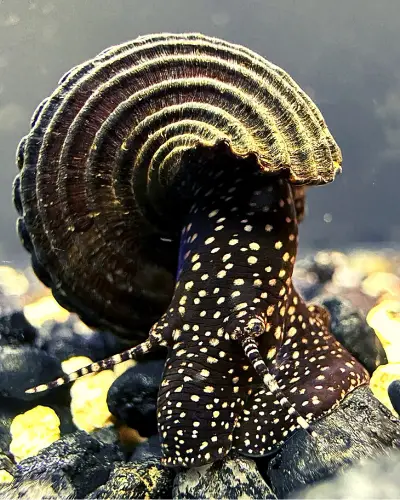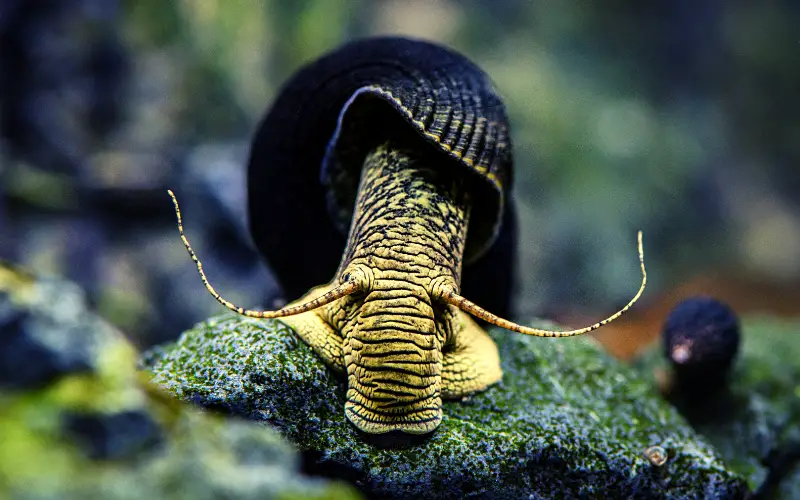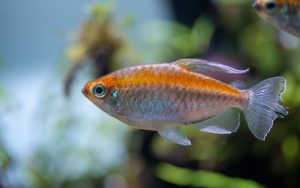So you’re thinking about adding some adorable rabbit snails to your freshwater tank—a fantastic choice! These peaceful, algae-munching mollusks are a delight to watch. But before you introduce them to your existing aquarium community, a crucial question arises: Do rabbit snails eat other snails?
The answer is more nuanced than a simple yes or no, and it’s vital to understand the potential dynamics at play to ensure harmony in your underwater world.
Let’s dive deeper into the fascinating world of yellow rabbit snails and their dietary habits!
Rabbit snails, also known as Tylomelania, are a unique and intriguing species of freshwater snail popular among aquarium enthusiasts.

These snails are known for their curious behavior, distinctive appearance, and relatively peaceful nature. However, hobbyists often ask whether rabbit snails are predatory and if they eat other snails in the aquarium.
In this rabbit snail care guide, we will explore rabbit snails’ dietary habits and address the common misconception regarding their potential cannibalistic behavior.
We will delve into the natural diet of rabbit snails in the wild, their preferences in captivity, and whether they threaten other snail species in a closed aquarium environment.
By understanding rabbit snails’ feeding habits, aquarists can better care for these unique creatures and ensure the harmony of their aquatic ecosystem.
Table of Contents
ToggleAre Rabbit Snails Aggressive?
Rabbit snails are generally considered peaceful and non-aggressive. They do not typically attack or harm other tank inhabitants, including snail species, fish, or shrimp.
Their primary diet consists of algae and biofilm, which they graze on diligently, making them helpful cleanup crew members. However, there are some things to keep in mind:
- Competition for Food: While not directly aggressive, black rabbit snails might outcompete slower-moving snails for resources if food becomes scarce.
- Size Differences: Ensure tank mates are not small enough to be mistaken for food or accidentally trapped by a rabbit snail’s movement.
- Individual Temperament: As with any living animal, there can be slight variations in temperament. While rare, a particular rabbit snail might display territorial behavior, especially in confined spaces.
Overall, with proper care and a well-balanced environment, rabbit snails are unlikely to cause problems and can coexist peacefully with various tank mates.
Do Rabbit Snails Eat Other Snails?
Do rabbit snails kill other snails? The straightforward answer is no; rabbit snails do not typically eat other snails. They are primarily algae eaters and detritivores, meaning their diet consists mainly of algae, biofilm, and decaying plant matter. They lack the physical adaptations and predatory instincts to hunt and consume other snails.

However, there is a crucial exception: Mystery Snails. Mystery snails have softer shells than ordinary aquarium snails, making them vulnerable.
A rabbit snail might opportunistically feed on a weakened or deceased mystery snail if food is scarce. Additionally, if a mystery snail has recently molted and its new shell is not yet hardened, a rabbit snail may be tempted to nibble on the exposed soft tissue.
Here’s what you need to know to keep your snails safe:
- Avoid keeping rabbit snails with mystery snails to prevent any potential predation.
- Ensure a well-fed environment with ample algae and supplemental food sources like sinking pellets, algae wafers, or blanched vegetables to minimize the risk of opportunistic feeding.
- Provide sufficient space for different snail species to establish territories and reduce competition.
Understanding these dynamics allows you to create a harmonious aquarium environment where rabbit snails and other suitable tank mates coexist peacefully.
Can Rabbit Snails Live with Mystery Snails?
If you consider adding Rabbit Snails to your community tank that already houses Mystery Snails, you may wonder if they can coexist peacefully.
Rabbit snails are a great addition to your tank as they are easy to care for, active, and can help keep your tank clean. However, it is essential to note that Rabbit Snails and Mystery Snails are different types and may have different care requirements. Do some research on each species before adding them to your tank.
Rabbit Snails are generally healthy creatures and can tolerate various tank conditions. They prefer a planted tank with soft substrates, java ferns, and good water filtration.
If you already have Mystery Snails in your tank, make sure the water pH is not too low. Rabbit snails prefer slightly acidic water. Additionally, ensure that the tank is kept clean, and water conditions are optimal for both species.
Rabbit Snail Breeding IN YOUR AQUARIUM
Breeding rabbit snails in your aquarium can be a rewarding experience, but it’s important to know what you’re getting into before you start.
Unlike many other aquarium snails, rabbit snails are not hermaphrodites. This means you need to have both a male and female snail for them to reproduce.
Here’s a quick guide to breeding rabbit snails in your aquarium:
- Tank Requirements: Rabbit snails need a mature, stable tank with plenty of hiding places. They also prefer cooler temperatures than some other tropical fish, so aim for a water temperature between 72 and 78 degrees Fahrenheit.
- Diet: Rabbit snails are herbivores who eat algae, biofilm, and decaying plant matter. You can supplement their diet with blanched vegetables like zucchini, spinach, and carrots.
- Breeding: Rabbit snails can take up to a year to reach sexual maturity. Once they are mature, they can breed every 4-6 weeks. The female will lay a small white egg sac that contains 1-2 baby snails.
- Raising the fry: The baby rabbit snails will be tiny and need plenty of infusoria or other small food sources. You can also crush flake food into a powder to feed them.
Here are some additional tips for breeding rabbit snails:
- Keep your tank clean and well-maintained. Poor water quality can stress the snails and make them less likely to breed.
- Provide plenty of hiding places for the snails. This will help them feel secure and increase their likelihood of breeding.
- Be patient! Rabbit snails can take some time to start breeding, so don’t get discouraged if you don’t see results immediately.
With care and attention, you can successfully breed rabbit snails in your aquarium. Just be sure to research quickly and be prepared to care for the baby snails before you start.
Frequently Asked Questions About Compatible Rabbit Snail Tank Mates (FAQs)
Do rabbit snails get along with other snails?
Yes, rabbit snails are generally peaceful and coexist with most other snail species, except those with soft shells like Mystery Snails.
Will rabbit snails eat pest snails?
Rabbit snails primarily eat algae and biofilm, not other snails. They are unlikely to control pest snail populations in your aquarium.
Can assassin snails live with rabbit snails?
Yes, assassin snails and rabbit snails can generally coexist peacefully. They occupy different ecological niches and don’t pose a threat to each other.
Will rabbit snails eat mystery snails?
Caution is advised: while rabbit snails are generally peaceful, they may opportunistically eat mystery snails, especially if food is scarce or the apple snails are vulnerable.
What can live with rabbit snails?
Rabbit snails are peaceful tank mates. They can cohabitate with most fish, shrimp, and other snails, except those with soft shells like Mystery Snails.
Can rabbit snails be kept alone?
Yes, rabbit snail chocolate can be kept alone, but ensure adequate tank size for healthy shell growth. A minimum of 10 gallons is recommended for a single rabbit snail.
How long do rabbit snails live?
With proper care and a suitable environment, rabbit snails are known for their longevity and can live up to 3 years or even longer in some cases.
What is the difference between rabbit and trumpet snails?
Rabbit snails have a distinctive elongated shell, while Malaysian trumpet snails have a more cone-shaped shell. Rabbit snails are larger and prefer grazing on surfaces, unlike burrowing trumpet snails.
Can rabbit snails live with Nerite snails?
Yes, rabbit snails and Nerites can be peaceful tankmates! Their differing sizes and algae-eating habits make them a good fit for a balanced aquarium.
Are Nerite snails sensitive to nitrite?
Yes, Nerite snails are sensitive to ammonia and nitrite levels. While hardier than some fish, high levels can stress and harm them. Maintain clean water with regular testing and water changes.
Final Thoughts
Understanding the specific needs of rabbit snails and their potential tank mates can create a thriving and peaceful aquatic environment. Providing ample space, a balanced diet, and suitable companions is critical to ensuring their well-being.
So, do rabbit snails eat other snails? While they are generally peaceful herbivores, it’s crucial to avoid keeping them with vulnerable species like mystery snails and maintain a well-fed environment to prevent opportunistic feeding. With careful planning and consideration, you can enjoy rabbit snails’ beauty and gentle nature as they graze peacefully among their tank mates, adding a touch of tranquility to your underwater world.
More posts you may like
- Rabbit Snail Water Parameters 101: (A Guide to Happy Snails)
- What to Feed Rabbit Snails: (7 POWER Foods They LOVE!)
- Do Rabbit Snails Burrow: 5 Reasons Why You NEED Them!
- Freshwater Rabbit Snails Size 101: (Tank Size & Care Guide)
- Do Rabbit Snails Eat Plants in Aquarium: (Experts Advice)





